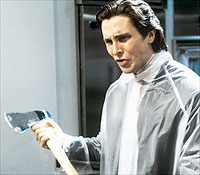

back to the coming soon page
 |
 |
back to the coming soon page |
 AMERICAN PSYCHO
AMERICAN PSYCHO |
|
Christian
Bale, Reese Witherspoon
|
 Funny,
pungent, and weirdly gripping, American Psycho is a satire that feels like
a hallucination; its tone of rambunctious, light fingered malevolence is
closer to late Buñuel, or the Kubrick of ''The Shining,'' than it is to
Bret Easton Ellis, on whose infamous 1991 novel the film is based. Yet director
Mary Harron (''I Shot Andy Warhol''), if anything, is an even more devious
provocateur than Ellis was. By treating the book as raw material for an
exuberantly perverse exercise in '80s nostalgia, she recasts the go-go years
as a template for the casually brainwashing- consumer/fashion/image culture
that emerged from them. She has made a movie that is really a parable of
today. Funny,
pungent, and weirdly gripping, American Psycho is a satire that feels like
a hallucination; its tone of rambunctious, light fingered malevolence is
closer to late Buñuel, or the Kubrick of ''The Shining,'' than it is to
Bret Easton Ellis, on whose infamous 1991 novel the film is based. Yet director
Mary Harron (''I Shot Andy Warhol''), if anything, is an even more devious
provocateur than Ellis was. By treating the book as raw material for an
exuberantly perverse exercise in '80s nostalgia, she recasts the go-go years
as a template for the casually brainwashing- consumer/fashion/image culture
that emerged from them. She has made a movie that is really a parable of
today. |
| Patrick Bateman (Christian Bale), a 26-year-old mergers and acquisitions turk, has a bottomless expense account, a society fiancée (Reese Witherspoon), and a fetishistically luxe white- on-white designer apartment. But he's a Hollow Man. He occupies a cool swank demimonde where everything, from dinner reservations to muscle tone, is a status symbol -- a signifier of identity. |
| Harron (''I Shot Andy Warhol''), working with gleeful precision, mythologizes the moment when America rediscovered the heady egomaniacal rush of conspicuous consumption. She revels in the decadent details -- the pasha's array of skin lotions that Patrick uses each morning, polishing his body like a vintage car; the hilariously nervous boardroom showdowns over who has the most extravagantly tasteful business card. |
| Yet all of this would be didactic, and not very original, if the upshot were merely that greed isn't good. ''American Psycho'' doesn't simply observe Patrick -- it sucks us into his upscale dementia. More than just corrupt, he's living in a Matrix (like us). He's so obsessed with taking his cues for what to wear, what to say, who to BE from the outside that nothing in his existence is quite real to him. Well, one thing is: He brings people over to his apartment -- a rival coworker, a date -- and happily slaughters them, letting loose the wrath he feels at having to dance on a treadmill of falseness. |
| Bale, who in movies like ''Velvet Goldmine'' has specialized in playing shrinking violets, here acts with a newly potent leading-man danger. During the murders, or when he's commencing a threesome with hookers, Patrick plays his favorite pop songs and discourses on why he loves them, and his soliloquies on Huey Lewis and the News' ''Hip to be Square'' or the oeuvre of Genesis are classics of bedazzled solipsism. The more a song justifies his empty, glossy existence, the more it leaves him in rapture. |
| After his coworker disappears, Patrick is questioned by a private eye (Willem Dafoe), and we feel protective of him -- not because we like what he's done, but because Bale lends such vivid, funny life to Patrick's squirmy inadequacy. After a while, Patrick begins to fall apart, and the movie takes a leap into the surreal. The transition doesn't entirely work; it's confounding when it should be haunting. Still, the more Patrick becomes unglued, the more Bale's performance grows in fevered power. He keeps Patrick lurching blindly toward humanity, until we see a self being born in a man who, paradoxically, was too selfish to have one. |
| Grade: A- |
| -- Owen Gleiberman |
| from: Entertainment Weekly Online |
|
© 2000 IHTML & Maria Jose All Rights Reserved. |